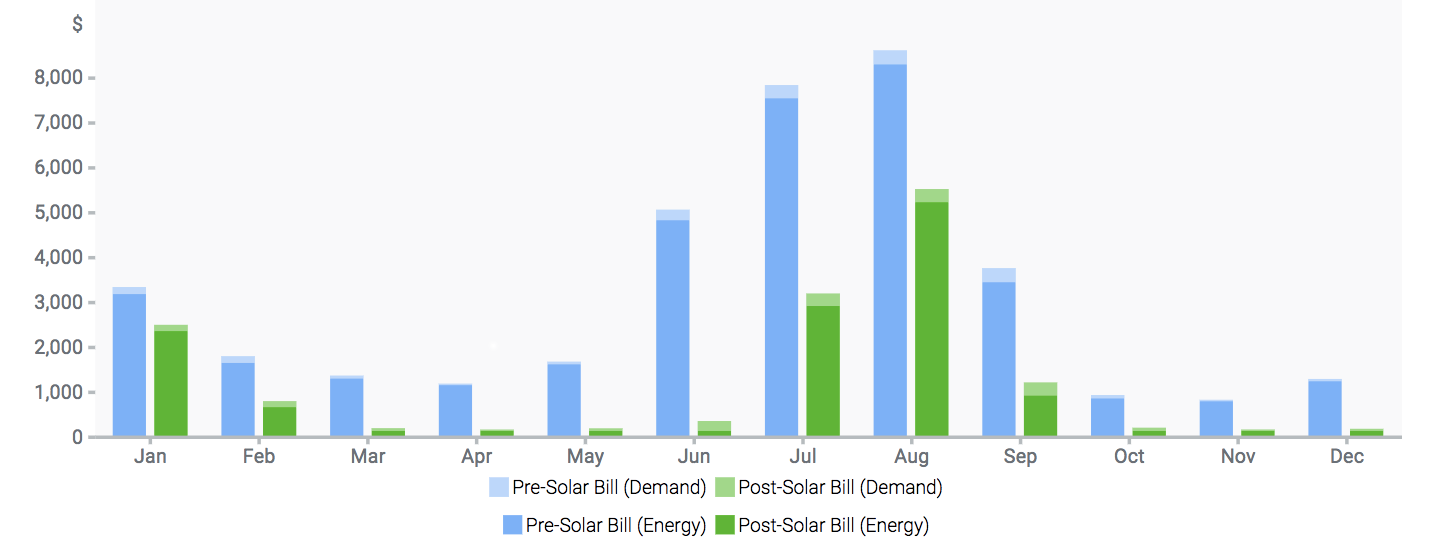Why are more and more businesses going solar? For one, being eco-friendly isn’t just good for the earth, it’s becoming increasingly good for the brand; more than two-thirds of consumers prefer to do business with environmentally responsible companies. Moreover, as PV prices drop, businesses are increasingly attracted to the strong financial benefits of going solar as well.
Financial Benefits of Solar to Business
Save on Electricity Bills: According to the Environment America Research & Policy Center, if all of the big-box stores in the US installed solar, they could collectively save $8.2 billion annually on their electricity bills. Additionally, in certain states such as Massachussetts, performance-based incentives such as Solar Renewable Energy Certificates (SRECs) directly translate energy production into increased utility bill savings.
 An example of a commercial customer’s savings after installing solar, estimated in Aurora.
An example of a commercial customer’s savings after installing solar, estimated in Aurora.
Save on Taxes: The Investment Tax Credit (ITC) allows owners of newly installed PV systems to receive a federal tax credit for 30% of the system cost. The full 30% credit will last until 2019, after which it will incrementally decrease through 2021 but will remain at 10% thereafter for commercial projects. Solar equipment is also eligible for accelerated depreciation thanks to the Modified Accelerated Cost Recovery System (MACRS), which allows an 85% deduction of the system value from property taxes for five years of purchase. For solar installations that are financed with a loan, the interest paid on the loan also lowers a client’s tax liability.
Protection against Inflation: Aurora’s study of EIA data shows that commercial utility rates increased an average of 2.4% per year between 2000 and 2015. Fortunately, the cost of producing solar energy stays largely constant over time. By investing in a PV system, a company can protect itself from hikes in electricity costs by offsetting its consumption in part, if not entirely.
Financing Options
Of course, not all businesses want to—or are able to—pay upfront. For those who cannot purchase the system upon installation with cash, other financing options can enable businesses to reap the environmental, social, and financial benefits of solar—sometimes without putting a penny down. However, there are long-term tradeoffs to consider.
Cash: In purchasing the system upfront, the business reaps the full benefits of savings on electricity bills, tax reduction, and hedging against inflation. However, owning the solar installation does mean that the business is responsible for all maintenance on the system.
Loan: Paying with a loan also ensures that the benefits of utility bill savings, lower taxes, and inflation hedging accrue to the business. A loan will result in less cash being paid up front for the solar installation, at the expense of interest accruing over the loan’s duration. However the interest payments on the loan are typically lower than the savings on the electricity bill, making this an attractive financing mechanism. Furthermore, interest paid in a solar loan is a tax deductible event.
Lease/PPA: Leases and PPAs are unique in that the business does not own the PV system. Instead, the system is owned by a third party which sells the electricity produced by the system to the business. With a lease, the business pays a fixed monthly amount for the right to use the PV system. With a PPA, the business purchases the power generated by the system at a pre-determined price per unit of energy the system produces ($/kWh). This lease payment, or the PPA rate, are often lower than the businesses bill savings or the prevailing utility rate respectively. This allows companies to save money on their electricity bills, and they do not have to worry about maintaining the system. However, since the system is owned by a third party, businesses do not get the tax savings, and they may not get the full inflation protection.
With so many nuanced financing options, it is critical to be able to analyze the best choice for your customer. Given the correct financial analysis tool, commercial installers have the power to bring any business to a greener and brighter bottom-line.